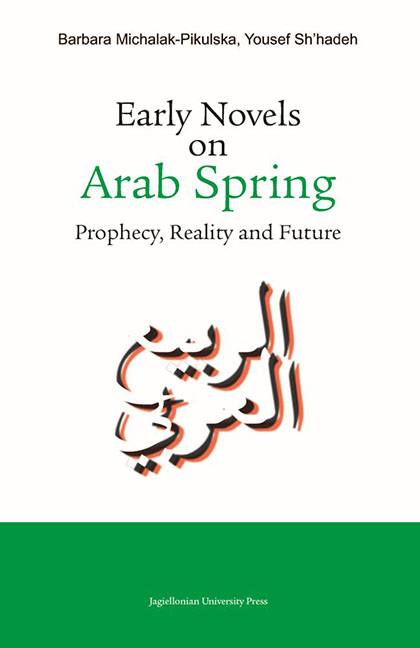Book contents
- Frontmatter
- Contents
- Introduction
- Part I Awakening of the Awareness of Subjugation – The Prophecy of the Spring of Nations in Arab Novels
- Part II At the Heart of the Arab Spring Events
- Part III The Future: The Spring Continues
- 17 Mu‘Taṣim Aš - Šā‘Ir : Uhzūǧat ar-raḥīl (A Song of Departure) and Fī intiẓār as-sulaḥfāt (Waiting for a Turtle)
- 18 Aḥmad ‘Abd Al - Malik : Al-Aqni‘a (Masks)
- 19 Ṭayba Aš - Šarīf Al - Idrīsī : Ḥaǧar min saqar (A Stone from Hell)
- 20 Amīra Aš - Širbīnī : ‘Itq (Liberation)
- 21 ‘ Izz Ad - Dīn Šukrī Fašīr : Bāb al-ẖurūǧ – risālat ‘Alī al-muf‘ama bi-bahǧa ġayr mutawaqqa‘a (The Gate to Leave – Ali’s Letter Filled with Unexpected Joy)
- Conclusion
- Bibliography
- Summary in Arabic
3 - Ibrāhīm Darġūṯī : Waqāi‘ mā ǧarā li-al-mar’a ḏāt al-qabqāb aḏ-ḏahabī (Circumstances Related to What Happened to a Woman in Golden Clogs)
Published online by Cambridge University Press: 13 October 2023
- Frontmatter
- Contents
- Introduction
- Part I Awakening of the Awareness of Subjugation – The Prophecy of the Spring of Nations in Arab Novels
- Part II At the Heart of the Arab Spring Events
- Part III The Future: The Spring Continues
- 17 Mu‘Taṣim Aš - Šā‘Ir : Uhzūǧat ar-raḥīl (A Song of Departure) and Fī intiẓār as-sulaḥfāt (Waiting for a Turtle)
- 18 Aḥmad ‘Abd Al - Malik : Al-Aqni‘a (Masks)
- 19 Ṭayba Aš - Šarīf Al - Idrīsī : Ḥaǧar min saqar (A Stone from Hell)
- 20 Amīra Aš - Širbīnī : ‘Itq (Liberation)
- 21 ‘ Izz Ad - Dīn Šukrī Fašīr : Bāb al-ẖurūǧ – risālat ‘Alī al-muf‘ama bi-bahǧa ġayr mutawaqqa‘a (The Gate to Leave – Ali’s Letter Filled with Unexpected Joy)
- Conclusion
- Bibliography
- Summary in Arabic
Summary
The novel is not directly about the revolution, but Ibrāhīm Darġūṯī exposes the corruption that has ruled the whole country under Ben Ali’s rule. However, it does not give an answer as to how to free yourself from the dictatorship that underlies widespread corruption in society. The author does not speak directly about the revolution in Tunisia, but only alludes to it. Nevertheless, one can guess that the writer is skeptical and even perceives it as a negative event. Darġūṯī does not refer to President Ben Ali by name, but instead gives him the symbolic name of the bestial Mongol commander “Hulagu,” who in 1258 conquered Baghdad and contributed to the final collapse of the Abbasid dynasty. In his opinion, the revolution is not a spring of the people, but brings anarchy and destabilization.
The following passage, being the narrator’s statement, is the only place in the novel where the author mentions the revolution in Tunisia:
I was surprised by the condition of this woman, whom I forgot for a moment because of the ongoing discussions about the situation of the country and its population and the chaos overcoming cities and desert areas after the escape of Hulagu by his plane, which left the noble people with palace and cars.
In the novel, the writer really uses the magical world in relation to modern life, its corruption and problems. He does this through a portrayal of a lost young girl who emotionally reacts to changes occurring in the country.
The novel Waqāi‘ mā ǧarā li-al-mar’a ḏāt al-qabqāb aḏ-ḏahabī (Circumstances Related to What Happened to a Woman in Golden Clogs) is an expression of anxiety and frustration of an author devoid of illusions. He exposes the hypocrisy of the authority, which can change selfhood and influence the behavior of the individual. It is always the most difficult to commit the first crime. Afterwards things seem to follow their own course.
- Type
- Chapter
- Information
- Early Novels on Arab SpringProphecy, Reality and Future, pp. 17 - 18Publisher: Jagiellonian University PressPrint publication year: 2022



